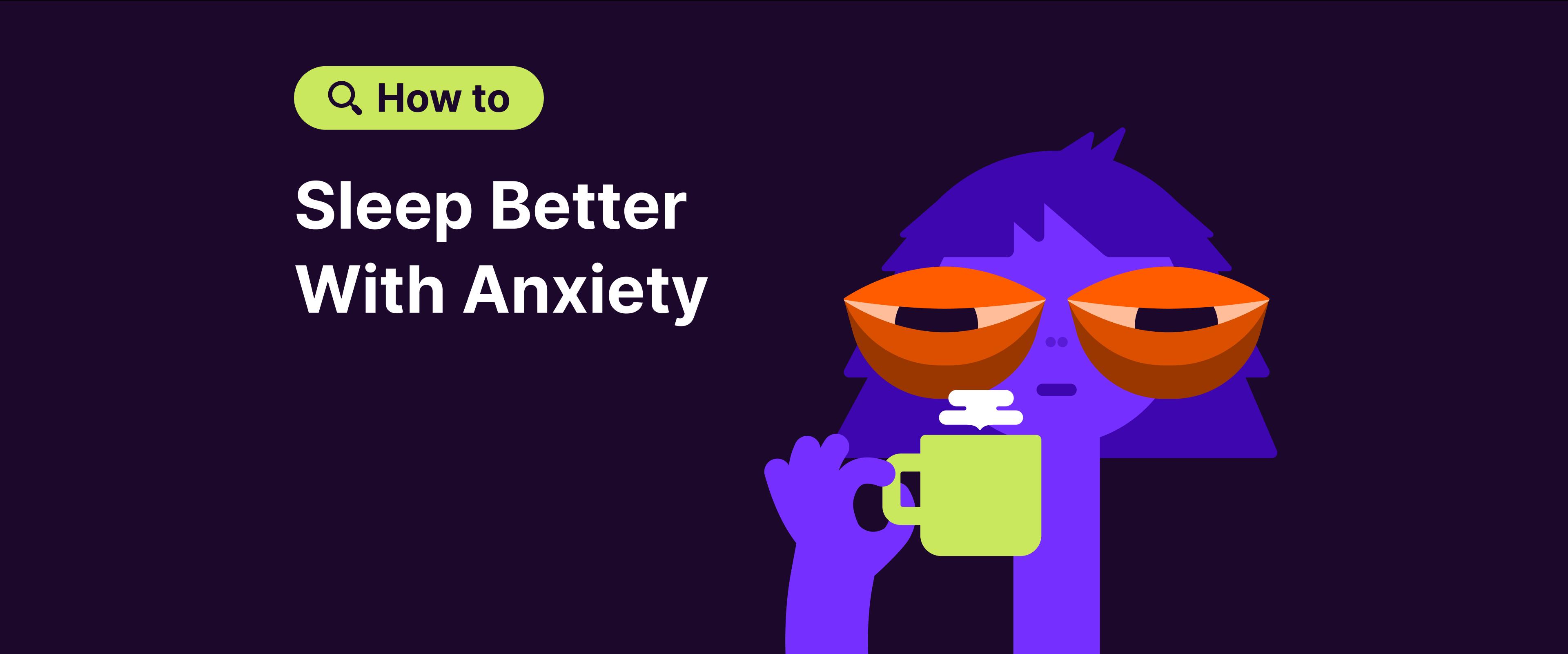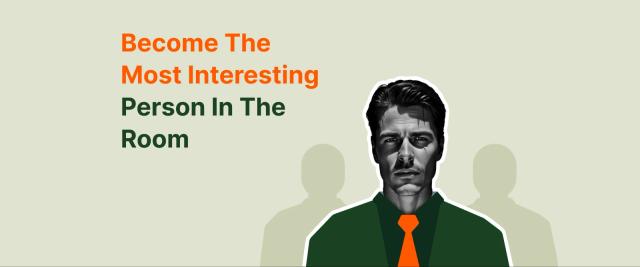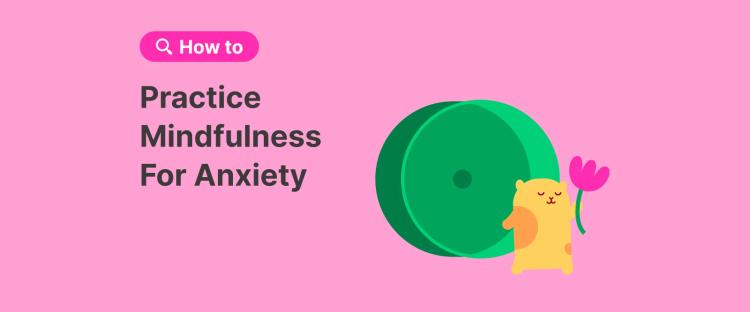Does anxiety make it hard for you to fall asleep? If so, you're not alone. According to The Sleep Foundation, over 40 million adults experience anxiety-related sleep problems each year in the US. Whether it's overwhelm and worry about work, relationships, health, or simply the fear of not sleeping itself, anxiety can make a good night's sleep feel impossible.
Hi, I'm Jennifer Roblin, an Anxiety Specialist, Therapist, and Founder of Better Your Life. In this article, I'll teach you how to sleep better with anxiety and share what I've learned from both my personal healing and my work with hundreds of clients who've faced the same nighttime struggles.
By drawing insights from Headway book summaries like 'Get Out of Your Head' by Jennie Allen, 'Hardcore Self-Help' by Robert Duff PhD, and 'How to Stop Worrying and Start Living' by Dale Carnegie, you'll discover proven techniques to sleep better with anxiety and unlock the secrets to achieving restful nights.
Download the Headway app today and reclaim your sense of calm with expert tips!
Quick summary:
Try CBT-I techniques: Challenge unhelpful thoughts and keep a sleep diary
Calm your nervous system: Use progressive muscle relaxation to activate your body's rest response
Optimize daily habits: Avoid caffeine and heavy meals before bed
Create a sleep sanctuary: Remove screens and use calming scents like lavender
Break the anxiety-insomnia cycle: Seek professional help if sleep problems persist
Keep reading for the full list of tips!
How to sleep better with anxiety: Three proven strategies that work
Sleep is vital for our survival, and, like food and oxygen, we can't live without it. During REM and deep sleep, we repair tissue, build muscles and bones, and strengthen our immune system.
Here are some natural strategies to help you:
1. Try Cognitive Behavioral Therapy (CBT-I)
Cognitive Behavioral Therapy for Insomnia is an evidence-based therapy that can help you overcome existing sleep challenges and resume healthy sleeping patterns.
The Sleep Foundation recommends it to help you identify the thoughts that contribute to poor sleep, as well as behaviors such as what you eat and drink, and when or if you exercise. It includes techniques such as keeping a sleep diary to see where improvements can be made.
CBT-I supports falling asleep faster, sleeping more soundly, and feeling more in control of your sleep.
Jennie Allen explains how we should also challenge unhelpful thoughts and beliefs like, "If I don't sleep, I'll be useless tomorrow," as how we think shapes how we live.
📘Try Headway and turn reading into a self-growth habit!
2. Use paradoxical intention to ease pressure
Paradoxical intention involves initially delaying bedtime and trying not to sleep, as this can remove the pressure to fall asleep and, ironically, make sleep more likely. Falling asleep is difficult if you try too hard; the secret is acceptance, not control.
It is also worth remembering that while your thoughts and mind keep you awake, your body still remembers exactly how to sleep.
📘Get the Headway app and level up your reading skills!
3. Practice deep relaxation techniques
Stress and anxiety live in the body, so we need to calm our nervous system and activate our rest-and-digest response, which is the opposite of our fight-or-flight response.
There are many ways to achieve this, including:
Progressive muscle relaxation
Progressive muscle relaxation techniques work by releasing physical tension.
This exercise involves tensing or squeezing different muscle groups as you take a deep breath in and then releasing and relaxing them as you slowly breathe out.
Start by taking a long, deep breath in and out. On the next breath, squeeze and tense your toes, then relax as you exhale.
Move to your calf muscles, squeeze and tense them as you inhale, notice the tension, and then release when you exhale.
Next, tense your thigh muscles, releasing as you exhale.
Continue up your body, tensing and releasing each part. Move through your stomach muscles, chest, neck, and shoulders, then tense your arm muscles and squeeze your hands into fists. As you exhale, relax and let the tension go.
Next, scrunch your face up as you inhale, and relax as you exhale. Lastly, tense your entire body, and then release on a big, long sigh. Relax and let go. Notice how you feel now.
📘Stop scrolling, start growing with the Headway app!
Guided imagery
Visualise a peaceful place using guided imagery.
Close your eyes and try to imagine somewhere relaxing, perhaps your favorite place in the world. It could be a beach, maybe a mountain retreat, or a forest. It doesn't have to be real; it just needs to feel calming. Imagine you are there, enjoying the peacefulness of nature.
Now, picture how it looks and try to engage all your senses. What can you see in this image? What can you hear and smell? Can you feel the sun or the wind on your face? Take a deep breath and imagine breathing in the clean, fresh air. Stay with this vision for several minutes until you feel calmer.
Take a few more deep breaths and slowly open your eyes.
📘Find more insights in Headway book summaries!
Mindfulness and meditation
Mindfulness teaches us to observe thoughts without judgment. Research shows it reduces rumination and improves sleep quality by calming the amygdala, the brain's alarm centre that triggers anxiety.

Try some mindful 4-7-8 breathing before bed. This will signal to your nervous system that you are safe right now.
As you inhale slowly and deeply for a count of four, feel your stomach muscles expand as you focus on your deep breath.
Hold your breath for a count of seven.
Exhale for a count of eight and feel your stomach muscles contract again.
Repeat for three rounds, and then notice how you are feeling.
Want help making this a habit? Explore the Headway summary of 'Get Out of Your Head' by Jennie Allen, which shares powerful methods to interrupt anxious spirals.
Daily habits that help you sleep better with anxiety
Sometimes, the solution isn't in our mind but our daily choices. Consider the following to see if any areas could be improved.
Eat and drink with sleep in mind
Foods and drinks that can trigger anxiety and disturb sleep include:
Caffeine (even from tea, soda, and chocolate)
Alcohol
High-sugar or processed foods
Instead, opt for:
Herbal teas like chamomile
Magnesium-rich foods (spinach, pumpkin seeds, almonds)
Tryptophan-containing snacks (turkey, banana, oats)
Avoid heavy meals just before bedtime.
📘Download the Headway app and become more productive, starting now!
Exercise for anxiety relief and restful sleep
Regular aerobic exercise releases feel-good hormones such as endorphins, reduces anxiety, and promotes deeper sleep. However, to avoid overstimulation, finish intense workouts at least three hours before bedtime.
A walk or a gentle stretch still counts if you seek something less intense.
📘Learn more about productive habits with the Headway app!
Create a sleep-friendly environment
 Your bedroom should be a haven for rest. Here's your to-do list to create a calm space:
Your bedroom should be a haven for rest. Here's your to-do list to create a calm space:
Keep your bedroom dark, quiet, and cool
Invest in a comfortable mattress and pillow
Remove televisions, phones, and blue light sources
Use calming scents like lavender or vetiver
Consider a white noise machine or calming sleep playlist if you find you are being distracted by noises in your environment
Use your bed only for sleep and intimacy — no working, scrolling, or worrying!
📘Read more books in less time with Headway book summaries!
Why anxiety makes it hard to sleep
In 'Hardcore Self Help,' Robert Duff explains that the sole purpose of anxiety is to ensure our survival. It is an evolutionary response to danger, and we have to go back to the beginning of existence to understand why we have it and how it has served us.
Imagine back to when we were all living in caves — anxiety would keep us hypervigilant and help us avoid being attacked and eaten by sabre-tooth tigers. Back then, it was really helpful!
The challenge we have today is that our brains still behave instinctively. However, nowadays, instead of feeling anxious about tigers, we worry about our inboxes, relationships, or work.
We are bombarded with so many stimuli that can make us feel in a constant state of anxiety, even when our lives are no longer in danger. These anxiety causes now trigger the same symptoms of anxiety, even though the threat isn't real.
📘Get the Headway app and level up your reading skills!
Anxious thoughts and cognitive distortions
Anxiety affects both humans and animals. The difference is that humans have the ability to remember the past and think forward, whereas animals are always in the present moment.
This means humans can worry about things that have not yet happened, which often never occur as we think. Dale Carnegie discusses the benefits of living in the moment in 'How to Stop Worrying and Start Living.'
We also have a negativity bias because, let's face it, back then we didn’t need to know what it feels like to skip through a meadow of flowers, but we did need to remember where the tiger was hiding.
This negativity bias enables us to create a worst-case scenario in our minds, and we begin to catastrophize. We call this way of thinking Cognitive Distortion — a common source of anxious thoughts that interfere with sleep.
How anxiety disrupts the body’s sleep system
In 'Get Out of Your Head,’ Jennie Allen states that the average person has over thirty thousand thoughts daily. Of those, so many are negative that, according to researchers, the vast majority of the illnesses that plague us today are a direct result of toxic thoughts.
When our bodies and brains are in survival mode, we are obviously not thinking about sleep!
Anxiety activates the sympathetic nervous system, releasing cortisol and adrenaline — the very hormones that keep us alert and ready to run away from danger.
This is known as the fight-or-flight response. It’s really helpful when we need to run away from danger, but it’s not so beneficial when we are lying in bed and trying to fall asleep.
These stress chemicals also disrupt the body’s natural circadian rhythm and inhibit melatonin production, which is crucial for initiating sleep. Even if your sleep schedule is consistent, anxiety can override it and keep you wide awake.
📘Stop scrolling, start growing with the Headway app!
The anxiety-insomnia cycle and why it's so hard to break
A study by Harvard Medical School confirms the cyclical nature of anxiety and insomnia, whereby anxiety increases sleep disturbances, and lack of sleep increases anxiety, thus creating an anxious spiral.
So, the next day, you may feel even more anxious, which makes it even harder to get to or stay asleep.
Over time, this cycle can intensify and contribute to more serious sleep disorders or conditions such as sleep apnea, panic disorder or post-traumatic stress disorder.
That's why breaking the cycle is essential — and thankfully, it's absolutely possible with the right treatment options or anxiety medication, support from a mental health professional, and consistently good sleep hygiene.
📘Find more insights in Headway book summaries!
When to get help for anxiety-related sleep problems
 Signs you may need extra support include:
Signs you may need extra support include:
You dread bedtime due to anxiety
You've had sleep problems for over 3 months
You feel persistently tired, irritable, or unable to concentrate
You've tried several strategies, and nothing helps
At times, insomnia and anxiety can feel overwhelming to navigate alone.
Reaching out to an anxiety specialist can offer vital support, equipping you with practical tools and fresh perspectives.
Talk therapies such as cognitive behavioral therapy (CBT), and interventions such as Neurolinguistic Programming (NLP), alongside heart-centred approaches, have proven highly effective in managing anxiety and strengthening resiliency and coping skills.
Remember, you're not failing by seeking help; you're giving yourself the best chance of healing.
📘Download the Headway app and become more productive, starting now!
Take the next step toward peaceful sleep with Headway's curated summaries
Still wondering how to sleep better? These expert-recommended books are available as powerful, time-saving summaries on the Headway app.
Each summary could forever change the way you approach your nights. After all, you deserve to feel calm and rested every evening.
Remember, anxiety and insomnia are deeply connected, but they're not your destiny. Small, consistent steps, from muscle relaxation to book summaries, can make a big difference. Help is available.
Download the app today to discover proven techniques and practical steps to peaceful naps!
Frequently Asked Questions
What causes sleep anxiety?
Sleep anxiety is often caused by an overactive mind at night, fear of not falling asleep, or past experiences with trouble sleeping. It can be linked to sleep disorders, chronic stress, or generalized anxiety disorder, where bedtime becomes a trigger for worry. Poor sleep hygiene and irregular sleep habits can also contribute to this cycle by keeping the brain in a state of high alert.
How many hours of sleep are good for anxiety?
For adults struggling with anxiety, getting 7 to 9 hours of sleep per night is ideal. Inadequate rest can raise heart rate, increase blood pressure, and worsen symptoms of mental health conditions like generalized anxiety disorder. Prioritizing consistent sleep supports emotional regulation and prevents the negative effects of a lack of sleep.
How to calm anxiety at night naturally?
To naturally calm nighttime anxiety, focus on methods that regulate your nervous system. Breathing exercises to slow your heart rate, journaling before bed, and progressive muscle relaxation can all help. Creating better sleep hygiene, like avoiding screens and caffeine late in the day, can also reduce anxiety and promote restful sleep without sleep medicine.
How to stop having panic attacks at night?
Nighttime panic attacks often occur when stress builds up and isn't released throughout the day. To prevent them, practice grounding techniques like the 3-3-3 rule, reduce stimulants, and try journaling before bed to offload intrusive thoughts. Strengthening your sleep habits and addressing underlying sleep anxiety can also make these episodes less frequent.
Why is anxiety worse at night?
Anxiety often worsens at night because there are fewer distractions and more time for the mind to spiral. The body's blood pressure and cortisol levels may shift, and a lack of sleep the night before can increase vulnerability. Poor sleep hygiene, overstimulation from screens, or skipped meals can all play a role in triggering sleep anxiety during quiet nighttime hours.
What is the 3-3-3 rule for anxiety sleep?
The 3-3-3 rule is a simple grounding method to manage anxiety, especially before sleep. It involves naming three things you see, three things you hear, and three parts of your body you can move. This technique brings you back to the present moment and reduces racing thoughts, making it a helpful addition to your mental health toolbox for better sleep.










